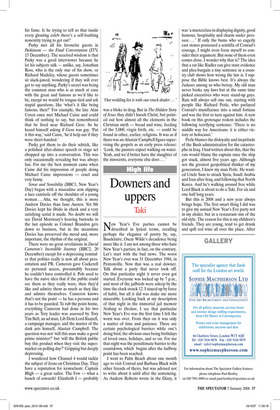Lies and humiliation
Simon Hoggart
We said goodbye to Michael Parkinson and Andy Millman over Christmas. Andy Millman was the hero of Extras, whose finale went out on BBC1 on 27 December. This was what I think of as a sit-traj, a comedy with more misery than laughs. It was mainly about humiliation: Andy’s doll, based on his character in his grisly sitcom, is outsold by a Jade Goody doll that screeches racist abuse. A harridan from the Guardian (I genuinely have no idea which of my colleagues was meant) harasses him into admitting he’s been lying. The Ivy has no table for him. Schoolboys yell abuse at Darren, the world’s most hopeless agent. The real George Michael is shown cruising on Hampstead Heath and Andy points the paparazzi his way. Only Hale and Pace are more thoroughly humiliated. Maggie lives in a one-room flat and works as a cleaner. Finally, Andy realises he has become a monster, regrets it and goes off with Maggie in a cosy sentimental ending, very much like the finale of The Office. Which was kind, since it was the only cheery moment in the whole 85 minutes. It was all rather odd. Ricky Gervais himself seems to be loving his fame. Is he trying to tell us that inside every gloating celeb there’s a self-loathing nonentity trying to get out?
Parky met all his favourite guests in Parkinson — the Final Conversation (ITV, 15 December). The received wisdom is that Parky was a good interviewer because he let his subjects talk — unlike, say, Jonathan Ross, who is the only star of his show, or Richard Madeley, whose guests sometimes sit slack-jawed, wondering if they will ever get to say anything. Parky’s secret was being the common man who is as much at ease with the great and famous as we’d like to be, except we would be tongue-tied and ask stupid questions, like ‘what’s it like being famous, then?’ For example, the late Alan Coren once met Michael Caine and could think of nothing to say, but remembered that he lived near Richard Gere. So he heard himself asking if Gere was gay. ‘Put it this way,’ said Caine, ‘he’d help out if they were short-handed.’ Parky got them to do their schtick, like a polished after-dinner speech or stage act chopped up into a conversation. This was only occasionally revealing but was always fun. For me the best moment came when Caine did his impression of people doing Michael Caine impressions — cruel and very funny.
Sense and Sensibility (BBC1, New Year’s Day) began with a masculine arm slipping a lace camisole off the shoulder of a young woman ... Aha, we thought, this is more Andrew Davies than Jane Austen. Yet Mr Davies kept his libido in check and a very satisfying serial it made. No doubt we will see David Morrissey’s heaving buttocks in the last episode as Colonel Brandon gets down to business, but in the meantime Davies has preserved the mood and, more important, the rhythm of the original.
There were no great revelations in David Cameron’s Incredible Journey (BBC2, 20 December) except for a depressing reminder that politics really is now all about presentation and PR. Cameron gave Cockerell no personal access, presumably because he couldn’t have controlled it. Pols used to have the naive idea that if the public could see them as they really were, then they’d like and admire them as much as they like and admire themselves. Cameron knows that’s not the point — he has a persona and it has to be guarded. To rub the point home, everything Cameron had done in his two years as Tory leader was assessed by Tory Tim Bell, an ad man, Lib Dem Lord Razzell, a campaign manager, and the master of the dark arts himself, Alastair Campbell. The question was not ‘will this man make a good prime minister?’ but ‘will the British public buy this product when they visit the supermarket on polling day?’ Gripping but deeply depressing.
I wondered how Channel 4 would tackle the subject of Jesus on Christmas Day. They have a reputation for iconoclasm: Captain Bligh — a great sailor. The Few — what a bunch of cowards! Elizabeth I — probably was a bloke in drag. But in The Hidden Story of Jesus they didn’t knock Christ, but pointed out how almost all the elements in the Christian myth — bread and wine, feeding of the 5,000, virgin birth, etc. — could be found in other, earlier, religions. It was as if there was an Alastair Campbell figure supervising the gospels as an early press release: ‘Look, the punters expect walking on water. Yeah, and we’d better have the slaughter of the innocents, everyone else does ... ’



















































 Previous page
Previous page